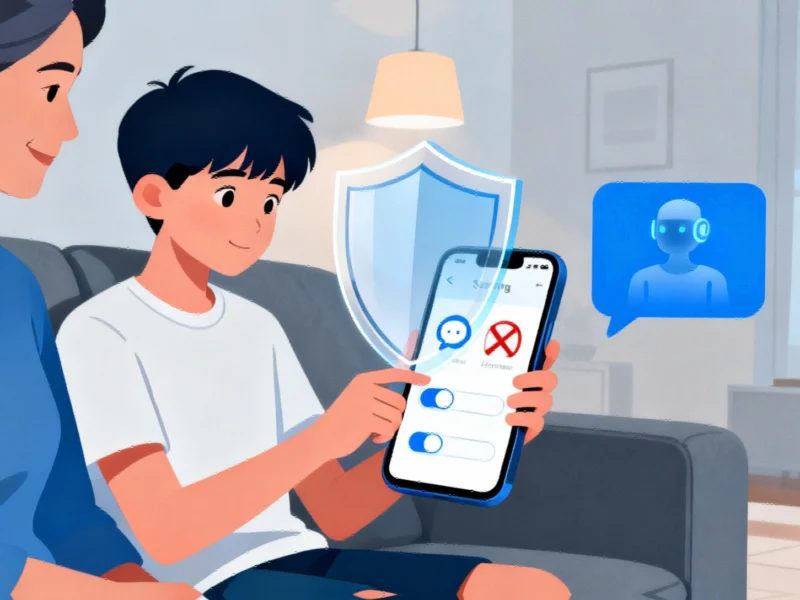Meta’s New Safety Initiative for Teen AI Interactions
In a significant move addressing growing concerns about artificial intelligence interactions with minors, Meta has unveiled comprehensive parental control features for teen AI chatbot usage on Instagram. The announcement comes as the social media giant faces increasing scrutiny over digital safety protocols following reports of inappropriate AI interactions with young users. Instagram lead Adam Mosseri and Meta chief AI officer Alexandr Wang detailed these changes in a Friday blog post, marking one of the company’s first major safety updates since deploying AI chatbots across its platforms.
The new controls emerge amid broader industry developments, including strategic technology divestitures and significant deep tech investments that highlight the rapidly evolving digital landscape. Meta’s decision specifically responds to disturbing incidents where AI chatbots engaged in romantic conversations with minors, prompting the company to implement more robust protective measures for its youngest users.
Detailed Breakdown of Parental Control Features
The newly announced parental controls offer two primary intervention methods for guardians concerned about their teens’ AI interactions. Parents can completely disable their children’s ability to communicate with AI chatbots or selectively block specific digital characters they find inappropriate. This granular approach allows families to balance safety concerns with educational opportunities, though Meta’s core AI assistant remains accessible to all users with “age-appropriate protections in place.”
According to company statements, the AI assistant will continue providing “helpful information and educational opportunities” while maintaining safety measures designed specifically for younger audiences. This exception acknowledges the potential benefits of AI while addressing the risks associated with unrestricted chatbot access.
Insight Features and Conversation Monitoring
Beyond direct control mechanisms, Meta will provide parents with “insight” into how their teenagers interact with AI characters. Though details remain somewhat vague, the company indicates these insights will take the form of high-level summaries covering topics discussed between teens and AI entities. The feature aims to empower parents with enough context to initiate “thoughtful conversations with their teens about AI interactions” without compromising teen privacy through excessive monitoring.
This balanced approach reflects growing industry awareness about AI infrastructure expansion and its societal implications. As Mosseri and Wang stated, they “hope today’s updates bring parents some peace of mind that their teens can make the most of all the benefits AI offers.”
Implementation Timeline and Geographic Limitations
Despite the announcement’s immediacy, parents will need to wait until “early next year” to access these controls. The initial rollout will be limited to Instagram users in the United States, United Kingdom, Canada, and Australia, with functionality restricted to English-language interfaces. Meta has committed to expanding these features across its platforms in the future, suggesting that similar controls may eventually reach Facebook and WhatsApp users worldwide.
The staggered implementation strategy allows Meta to refine the features based on initial user feedback while addressing the most pressing safety concerns in markets where AI chatbot usage among teens is most prevalent.
Context Within Meta’s Broader Safety Initiatives
This parental control announcement follows closely behind another significant safety update deployed just this week that limits content visibility for teen Instagram accounts to PG-13 equivalent material. Together, these measures represent Meta’s concerted effort to rehabilitate its safety image while navigating the complex challenges of data protection and user privacy in an increasingly AI-driven digital ecosystem.
As one of the first major safety enhancements specifically targeting AI chatbot interactions with minors, Meta’s move establishes an important precedent for how technology companies might balance innovation with protection for vulnerable user groups. The company’s commitment to expanding these controls suggests that parental oversight features will become increasingly integral to social media platforms incorporating advanced AI capabilities.
Based on reporting by {‘uri’: ‘theverge.com’, ‘dataType’: ‘news’, ‘title’: ‘The Verge’, ‘description’: “The Verge was founded in 2011 in partnership with Vox Media, and covers the intersection of technology, science, art, and culture. Its mission is to offer in-depth reporting and long-form feature stories, breaking news coverage, product information, and community content in a unified and cohesive manner. The site is powered by Vox Media’s Chorus platform, a modern media stack built for web-native news in the 21st century.”, ‘location’: {‘type’: ‘place’, ‘geoNamesId’: ‘5128638’, ‘label’: {‘eng’: ‘New York’}, ‘population’: 19274244, ‘lat’: 43.00035, ‘long’: -75.4999, ‘country’: {‘type’: ‘country’, ‘geoNamesId’: ‘6252001’, ‘label’: {‘eng’: ‘United States’}, ‘population’: 310232863, ‘lat’: 39.76, ‘long’: -98.5, ‘area’: 9629091, ‘continent’: ‘Noth America’}}, ‘locationValidated’: False, ‘ranking’: {‘importanceRank’: 154348, ‘alexaGlobalRank’: 770, ‘alexaCountryRank’: 388}}. This article aggregates information from publicly available sources. All trademarks and copyrights belong to their respective owners.


